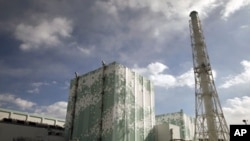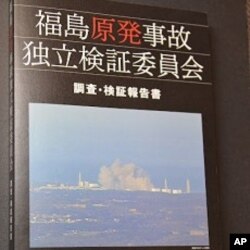The authors of the most comprehensive independent report on Japan's nuclear reactor meltdowns last year say the country was “very lucky” to have avoided a “worst-case scenario” that would have prompted the evacuation of Tokyo. But they warn that dangers remain because of the way Japan's nuclear industry is managed and regulated and how plants in the country were built.
The 420-page report says the crisis at the Fukushima nuclear plant was made worse because the plant's nuclear reactors and spent fuel pools were too close to each other and, and that the same problem exists at other nuclear plants in Japan.
Woefully unprepared
The report, which took six months to compile, is based on interviews with 300 people conducted by about 30 investigators, including academics, lawyers and freelance journalists. It finds that Japan was woefully unprepared for the unprecedented compound disaster.
The commission's chairman, Koichi Kitazawa -- a former head of Japan's science and technology agency -- says a “myth of absolute safety” blinded the nuclear industry and government regulators. “We found that Japan, as a whole, was not ready at all to manage the crisis, from the accident site to the premier's office,” Kitazawa stated.
Another of the report's commissioners, Tetsuya Endo - the former chairman of the board of governors of the International Atomic Energy Agency - says Japan was more concerned about preventing public panic than sharing information. He says, therefore, there was no comprehensive communication between the U.S. and Japanese governments in the critical, initial days of the crisis.
“So both sides got rather suspicious of each other's intentions. It took about two weeks to rectify that situation,” Endo explained.
Starting point
The commission did not delve into legal responsibilities, but suggests its report should be the starting point for any criminal case.
The veteran journalist who launched the foundation overseeing the report, former Asahi Shimbun editor Yoichi Funabashi, was asked by a reporter (Thursday) whether anyone should go to jail for what happened at the Fukushima nuclear power plant.
“I feel personally that should be the case,” Kitazawa noted.
Muted response
The government and the utility which operates the plant, Tokyo Electric Power Company (known as TEPCO) have had a muted response to the commission's report -- saying they have not had enough time to review it.
TEPCO did not cooperate with the commission. But investigators interviewed some retired officials of the utility. They noted there was “deep distrust” between Prime Minister Naoto Kan's top policy makers and the power company. The commissioners also revealed there was a similar distrust between TEPCO's headquarters and those on site at the Fukushima plant, as the reactors melted down.
Nearly one year after the March 11th disaster, triggered by a magnitude 9.0 earthquake and devastating tsunami, the Fukushima plant is still relying on makeshift equipment and pouring water into the three damaged reactors to maintain their stability. Dangerous levels of radiation continue to hamper critical inspections and repair work.
Officials say it is likely to take many decades before the crippled plant can be decommissioned.














